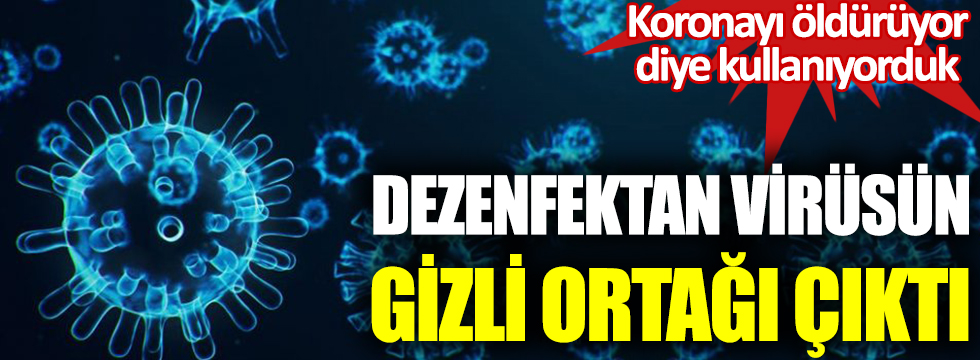
[ad_1]
Noting that the use of hand sanitizers has increased with the corona virus epidemic, infectious disease and clinical microbiology specialist Prof. Dr. Emine Sönmez recalled that hand hygiene is the most effective and easiest way. to prevent the spread of infectious diseases and warned about the use of disinfectants.
According to reports from DHA, a specialist in infectious diseases and clinical microbiology, who pointed out that the use of hand sanitizers has increased with the outbreak of the corona virus. Dr Emine Sönmez said: “Alcohol-based hand sanitizers should be used when soap and water are not accessible and hands should be washed with soap whenever possible. Hand sanitizers are not a substitute for washing with soap, but a temporary measure. Also; excessive use is harmful “ She said.
HAND WASHING MUST BE HABITS
Pointing out that people usually cover their mouths with their hands instead of using a tissue and sneeze into the palm, Prof. Dr. Emine Sonmez, “Shake hands with these virus- and bacterial-contaminated hands after a while, touching door handles, elevator buttons and cash dispenser buttons; it causes the contamination of every place touched and the spread of the disease “. She said.
Sonmez, “Door handles, elevator buttons, handrails, ATM buttons in shopping malls, schools and workplaces play a very important role in the transmission of viruses and bacteria between people. For this reason, the Sick people should be careful not to contaminate these places, and those who touch these places will have ‘contaminated’ hands in their mouth and nose. Hands play a very important role in the spread of infectious diseases, so hand washing should become a habit “. warned.
IF NOT WATER AND SOAP, USE A DISINFECTANT
Sönmez pointed out that hand sanitizers have gained importance with hand washing with the coronavirus epidemic, “Hand sanitizers are widely available for public use in shops, offices, restaurants, schools, public transport and other places and are personally abused. Use alcohol-based hand sanitizers (cologne, etc.) or other chemical hand sanitizers when soap and water are inaccessible and hands should be washed with soap whenever possible. Hand sanitizers are not a substitute for washing with soap, they are a temporary measure. She said.
THERE IS SOME DAMAGE
Emphasizing the damage that can result from the excessive use of hand sanitizers, Sönmez “These can increase the development of antimicrobial resistance and cause resistant bacteria, viruses and fungal infections. These resistant microbial infections are also serious diseases with high mortality rates. Also, hand sanitizers; It can dry out the skin, cause allergic reactions, threaten muscle health, trigger asthma, cause chronic skin diseases, eczema and adversely affect the immune system. ” She said.
Sonmez, “The chemicals in hand sanitizers can pave the way for Alzheimer’s and Parkinson’s disease, which we call long-term neurological disease, and cause tumors. Also, if the hand is very dirty, hand sanitizers won’t they destroy all germs and do not provide 100% cleanliness. In summary, excessive use of hand sanitizer is harmful. Hand washing should become a habit. Hand sanitizers should be used as a temporary solution when water and soap are not available “. He added.
EFFECTIVE HAND WASHING TECHNIQUE RECOMMENDED BY THE EXPERT
Specialist in infectious diseases and clinical microbiology Prof. Dr. Emine Sönmez stressed that washing hands with soap is sufficient to eliminate harmful microorganisms or mechanically remove them from the skin, and drew attention to the need to apply a washing technique. hands effective for this.
“There are three factors in effective hand washing technique such as water, soap and rubbing” Saying Sönmez, the tips for washing hands effectively “The hands are soaked in hot water and the liquid soap is distributed over all surfaces of the hands and completely foamed. The two hands are pressed together and the palms, fingers, fingers, the back of the hand and the inside of the nails, the wrists are rubbed vigorously for at least 20-30 seconds. Hands are scrubbed with soap and then rinsed thoroughly. Above all, hands are dried with disposable absorbent paper in public places. In public places the tap is closed with a paper towel and thrown into the bin. he listed.
WHEN SHOULD HANDS BE WASHED?
Stating in which cases it is necessary to wash hands, Prof. Dr. Emine Sonmez, “After wiping your nose, coughing or sneezing, after getting on public transport, after going to a public place, including markets and places of worship, and touching all materials and external surfaces, including money , hands must be washed “. She said.
Sonmez“It is necessary to wash hands before and after using the toilet, without taking care of a sick person, eating and after using the toilet. Hands should be washed permanently after touching the road and pets, changing the diapers of the children or helped children in the bathroom “. I speak.
 The data announced by TURKSTAT thus affect the pocket of the public official. Prof. Dr. Esfender Korkmaz explained
The data announced by TURKSTAT thus affect the pocket of the public official. Prof. Dr. Esfender Korkmaz explained
 Geology expert Oğuz Gündoğdu explained: This earthquake is not the expected Izmir earthquake.
Geology expert Oğuz Gündoğdu explained: This earthquake is not the expected Izmir earthquake.
 Before the end of the US elections, the dollar hit a record in euro and below. Okay now what?
Before the end of the US elections, the dollar hit a record in euro and below. Okay now what?
 In this way the immune system is strengthened
In this way the immune system is strengthened
 What is dry skin? How does dry skin manifest itself?
What is dry skin? How does dry skin manifest itself?
 The work of GOP Avrasya Hospital during the pandemic process
The work of GOP Avrasya Hospital during the pandemic process
.
[ad_2]
Source link